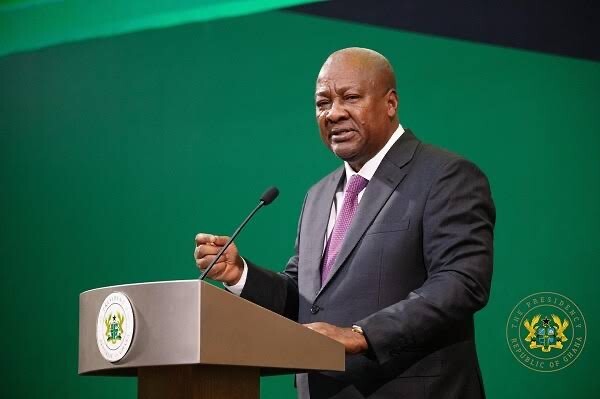In a bold step aimed at reducing government expenditure and promoting fiscal responsibility, President John Dramani Mahama has announced the immediate suspension of fuel allowances for all government appointees. The directive, which comes amid growing public concerns over excessive spending in government, is expected to ease pressure on the national budget.
Speaking at a press briefing at the Jubilee House, President Mahama described the move as “a necessary sacrifice” in the face of economic challenges and a commitment to leading by example. “We cannot continue to burden the state with costs that can be avoided. Leadership must begin with accountability, and this decision reflects our commitment to prudent economic management,” he stated.
The suspension affects ministers, deputy ministers, chief directors, and heads of state institutions who have traditionally benefited from monthly fuel allocations in addition to their official salaries and privileges. Instead, they will be expected to fuel their vehicles from their own resources. The announcement has been met with mixed reactions. While some civil society organizations and economic analysts have praised the president’s decision as timely and symbolic, others have raised questions about the sustainability of such measures in addressing broader structural issues within public spending. Dr. Amanda Boadi, a governance analyst with the Ghana Institute for Policy Studies, commended the president’s leadership:
Speaking at a press briefing at the Jubilee House, President Mahama described the move as “a necessary sacrifice” in the face of economic challenges and a commitment to leading by example. “We cannot continue to burden the state with costs that can be avoided. Leadership must begin with accountability, and this decision reflects our commitment to prudent economic management,” he stated.
The suspension affects ministers, deputy ministers, chief directors, and heads of state institutions who have traditionally benefited from monthly fuel allocations in addition to their official salaries and privileges. Instead, they will be expected to fuel their vehicles from their own resources. The announcement has been met with mixed reactions. While some civil society organizations and economic analysts have praised the president’s decision as timely and symbolic, others have raised questions about the sustainability of such measures in addressing broader structural issues within public spending. Dr. Amanda Boadi, a governance analyst with the Ghana Institute for Policy Studies, commended the president’s leadership:

“It’s a small but significant step. Curtailing some of these privileges will send a strong message about shared sacrifice and accountability at the top.”
However, critics warn that the measure must be part of a larger reform agenda. “Without deeper reforms in procurement, wage structure, and institutional spending, such measures may only serve as political optics,” said Kwesi Asamoah, an economist at the University of Ghana.
As Ghana navigates tight fiscal conditions, including external debt obligations and domestic revenue mobilization challenges, the Mahama administration appears poised to make cost-saving measures a key pillar of its governance strategy.
This development adds to a string of efforts by the government to demonstrate austerity, following earlier initiatives such as a freeze on new government vehicle purchases and restrictions on foreign travel for public officials.
Whether this policy shift will yield long-term savings or stir further debate about benefits for public officeholders remains to be seen.
However, critics warn that the measure must be part of a larger reform agenda. “Without deeper reforms in procurement, wage structure, and institutional spending, such measures may only serve as political optics,” said Kwesi Asamoah, an economist at the University of Ghana.
As Ghana navigates tight fiscal conditions, including external debt obligations and domestic revenue mobilization challenges, the Mahama administration appears poised to make cost-saving measures a key pillar of its governance strategy.
This development adds to a string of efforts by the government to demonstrate austerity, following earlier initiatives such as a freeze on new government vehicle purchases and restrictions on foreign travel for public officials.
Whether this policy shift will yield long-term savings or stir further debate about benefits for public officeholders remains to be seen.

